- Home
- Patrick Ness
The Crane Wife Page 3
The Crane Wife Read online
Page 3
‘Sensitive’, they called him in Parent/Teacher Conferences. ‘Dreamy, but in a good way.’ ‘Always with his hand in the air.’ ‘Such a special, tender little guy.’
‘Not special at all,’ said Miss Jones, in the first Parent/Teacher Conference of third grade, a scant two weeks after he’d started. ‘And far too much of a smarty-pants. No one likes a know-it-all. Not the other students and certainly not me.’
George’s parents had sat there in polite astonishment, his mother clutching her handbag as if it were a dachshund about to leap down and soil the carpet. His mother and father exchanged a look, his mother’s face especially retreating into that shocked expression she always got when unexpectedly confronted by life. Which essentially was every time she left the house.
George knew all this because 1) they were the kind of parents who would go to every Parent/Teacher Conference (he thought it might be the ‘only child’ thing; they didn’t want to miss even a moment, lest they irreparably screw something up) and 2) they’d been unable to get a sitter that night, despite the vast squadron of teenage girls usually on offer at the church, so he quietly drew with coloured pencils at a spare desk while his mother and father crouched, comically low, in the plastic children’s seats before Miss Jones’s desk.
But Miss Jones was only getting warmed up. ‘I just cannot tell you how tired I am,’ she said, lifting her eyes to Heaven as if praying for an answer to her tiredness, ‘of every single parent coming in here and telling me how their little Timmy or Stephanie or Frederico’ – she said the name so scornfully even George knew she was talking about Freddie Gomez, the only other boy who’d gone up to higher-grade reading groups with him and who smelled eye-wateringly of soap – ‘is special and talented and God’s gift to third grade knowledge.’
His father cleared his throat. ‘We’re not the ones saying it, though,’ he said. ‘The school–’
‘Oh, the school, is it?’ Miss Jones leaned forward, coming nearly all the way across her desk. ‘Let me tell you something, Mister Duncan,’ she said. ‘These boys and girls are six and seven and eight years old. What do they know about anything except how to tie their shoes and not wet themselves when the bell goes? And not that all of them are so great at that, I can tell you.’
‘Well, what does that have to do with the price of milk?’ his mother said, in a tense, strangled tone that made George’s ears prick. She was a nervous lady, his mother. She’d clearly been thrown off balance by Miss Jones’s forthrightness, her volume, her – let’s face it – blackness, and already he could see that things weren’t going to go well. He went back to colouring every quadrant of Snoopy the same shade of green.
It was just this moment when Miss Jones made her mistake. ‘Now, you listen to me, Mrs Duncan,’ she said, and she stuck out her finger and shook it in George’s mother’s face. ‘Just because your boy doesn’t eat paste doesn’t mean he’s gifted.’
George’s mother’s eyes never left the end of the dark brown finger wagging so close to her nose, following it as it bobbed up and down in righteous instruction, invading George’s mother’s space in a way that even George found obscurely upsetting, and just as George’s father said, ‘Now, you listen here,’ in his authoritative, construction foreman voice-of-doom, George’s mother leaned forward and bit the end of Miss Jones’s finger, snapping it hard between her teeth and hanging on for a surprising second or two before all the screaming started.
Now this story, when George told it, always made him nervous in that it gave slightly the wrong impression of his mother. Biting an obnoxious teacher’s finger – though not drawing blood and not quite so painfully that Miss Jones couldn’t be talked out of an assault charge by a principal who acted for all the world as if this wasn’t the first biting-of-Miss-Jones incident to come across his desk – could easily be read as a heroic action. His mother was the star of this story, and why shouldn’t she be? As family anecdotes went, it was a corker, retold with gales of laughter and at frequent request.
‘And I thought,’ his mother would say, blushing with horror and delight that every eye in the room was on her, ‘someone’s gonna bite that finger one of these days. So why not today?’
But George knew, really knew in his heart, that the biting wasn’t the act of someone mastering a situation and bringing it to a close with the perfect outrageous resolution. His mother had actually bitten Miss Jones because of a certain detachment from reality, a certain panicky falling-away from things. She was anxious to the point of brittle, like a champagne flute – when, age nineteen, George finally saw his first champagne flute – that needed wrapping and packing away. His father performed this function, taking care of every emergency, handling every possible crisis. His love of his wife – and George was quite certain that he loved her – took the form of ongoing protection that perhaps, in the end, did her more harm than good.
When Miss Jones waggled the finger, George was pretty sure his mother hadn’t felt insulted, she’d felt attacked, as if the world was tipping beneath her, and she’d bitten Miss Jones not as an act of triumphant assertion, but because she was trying to hold on. By her literal teeth. Life was unravelling under the threat of a single, terrible finger, looming as large as a coming apocalypse from which there would be no mercy, no forgiveness, just everlasting despair. Who wouldn’t lash out in the face of such a terrible affront?
That his mother had gotten it accidentally exactly right, well, that seemed to be just one of those things, and a part of him was pleased for her that, for once, she had. But the story that was told and the story underneath that story were different things, and perhaps irreconcilable.
The immediate result, anyway, was that George was airlifted out of Miss Jones’s third grade class at Henry Bozeman Elementary School and sent to the O Come O Come Emmanuel & Ransom Captive Israel Self-Directed Learning and Holiness Academy, which despite having ‘Israel’ in its name was wholly staffed by people who might never have actually met anyone Jewish in their entire lives. (Growing up in Tacoma, George knew any number of other evangelicals, plus a packet of Mormons, a few Catholics, and even practising Buddhists from the largest integrated Asian community in the country. Jewish people, not so much. He would only actually meet two Jewish people in his life before going to college in New York. Where he met several more.)
O Come O Come – loosely affiliated with his parents’ church, if perhaps only by good intentions – had a student body of a mere forty-eight pupils, kindergarten through twelfth grade, with learning done from self-read (and often self-marked) booklets, plus a half-day on Wednesday when the O Come O Come visiting minister held a church service in lieu of afternoon classes. This involved songs and sermons and a once-weekly change from the school uniform of yellow shirt with green tie and trousers to white shirt with green tie and trousers.
George was eight, and at eight the definition of normal is whatever is happening in front of you. He glossed over the differences from public school – starting with the comprehensively pale ethnicity of his new classmates – and got on with it, doing his usual ingratiation with the two elderly bachelorettes who ran the school: Miss Kelly with her red hair pulled back so tight she looked permanently surprised and Miss Aldershot with her kindly eyes, hairy chin and vicious way with a ruler.
George enjoyed himself there, on the whole, though his standards weren’t perhaps wildly high. He wasn’t a fan of the school-wide dodgeball, which was about all the elderly bachelorettes could come up with by way of physical education, aside from the occasional round of jumping jacks and running in place (all done for brief, sweaty spates without ever involving the removal of a tie), but he liked their library, though even ‘darn’ and ‘gosh’ had been blacked out of the school’s dog-eared copy of The Incredible Journey.
The boy closest to him in age there was Roy, an old-fashioned name even then, if not in quite the same way as ‘George’. Roy was a year older, a year taller, a year wiser, all of which was proved by the fact that he had a bike.
‘It’s from the War,’ he’d said to George when they first met. ‘My dad brought it back. He stole it from the Japs after we bombed them.’
This was the seventies and Roy’s dad was undoubtedly not much more than an infant during Nagasaki, but George swallowed every word like God’s Own Truth.
‘Wow,’ he said.
‘That’s why it’s so heavy,’ Roy said, tipping it up with some effort in his nine-year-old hands. ‘To survive the grenade attacks when you ride behind enemy lines.’
‘Wow.’
‘When I get older, I’m riding it all the way to Vietnam and throw grenades at the Japs.’
‘Can I try it?’
‘No.’
The school was on 35th Street. Roy lived on 56th and George lived on 60th in a house no one in the family would remember fondly. Usually his mother, who didn’t work, would pick him up at school and drive him home, but occasionally, when she was busy, he’d walk, going part of the way with Roy, who’d push the bike between them, its green metal bulk as steadfast and calm as a cow.
On this particular day, a spring one, the sun held court in the sky, with a few supplicant clouds criss-crossed by the vapour trails of jets from the nearby Air Force Base. Just the kind of lovely day when God liked to test you, Miss Kelly often said.
‘So then you find out the whole ship is a gun, right?’ George was saying, excitedly. ‘The whole ship! And it shoots this huge blast of light out the end and BOOM! They destroy the Gamilon home world!’
Roy’s family didn’t have a television because TV was where the Devil did his best recruiting (George had decided not to mention this problem to his own parents, though in retrospect it seemed unlikely they would have agreed, given the porn), so George would often fill their walk home with what Roy was missing.
‘Except it’s not a whole planet?’ Roy asked.
‘No!’ George shouted with amazement. ‘That’s the most incredible thing ever! It’s half a planet and it’s floating in space and there are cities on the top half and it’s all rocky and round on the bottom. Except it isn’t any more, because the Starblazers blew it up.’
‘Sweet,’ Roy said, with due respect.
‘No kidding, it’s sweet,’ George agreed seriously.
They reached 53rd, the busiest street between O Come O Come and their respective homes. They walked past the supermarket on the corner, its parking lot filled with slightly sluttier versions of their own mothers, along with kids smaller than Roy or George who tended to stare at their uniforms. Across the street was a gas station, filled with much the same.
Roy and George waited at the crosswalk for the light to change.
‘Except I think some Gamilons escaped or something,’ George said, ‘because no one seemed very happy. And there was also a lot of shouting and stuff I didn’t understand.’ He smiled again. ‘But the whole ship was a gun all along!’
The light turned green, and the ‘Walk’ signal came on. They entered the crossing, Roy pushing his bike along, George caught up in the unfathomable mysteries of Japanese animation.
‘I’m going to turn this bike into a gun,’ Roy said. ‘I’ll take it to Vietnam when I turn sixteen.’
George said, ‘That’d be.’
And the car hit them both.
When George told this part of the story, he invariably found himself saying ‘This actually happened’ and ‘I’m not making this up’ because it seemed too cruel that the car that had run the red light and knocked into Roy and the bike and him should have been driven by an eighty-three-year-old lady who could barely see over the steering wheel.
Sadly, it was the truth. If George had ever learned her name, he’d long forgotten it, but he’d remembered that she was eighty-three, that she was barely taller than him or Roy, and that the words she kept repeating afterwards were, ‘Please don’t sue me. Please don’t sue me.’ For the dignity of old ladies everywhere, George often wished this part of the story hadn’t happened, but there you were, sometimes life didn’t oblige with appropriate variation.
She wasn’t going especially fast, but the impact was so shockingly irresistible, so bluntly unstoppable, that both George and Roy cried out simultaneous, surprised ‘Ohs!’ as she drove into them.
And didn’t stop.
There were theories about this afterwards, most of them unsurprising: that the impact had taken a short while to filter through her diminished-by-age capabilities; that it had shocked her so much that she had simply frozen, her foot remaining on the accelerator rather than moving to the brake; or that the disbelief at what was occurring in front of her was so strong that, for a few terrible moments, she simply expected someone else to act. Whatever the reason, she hit them, and on she drove.
Roy had seen her coming at the very last second and had taken a step back, though not nearly far enough. The car hit his knees, spinning him around and throwing him to the pavement, out of the way, as she ploughed on through George and the bike.
George saw the impact, of course, but he couldn’t remember feeling it. Roy had been thrown out of his line of vision, and suddenly here was this massive, unstoppable block of metal filling it, knocking the wind out of him as he flattened his stomach across the bike seat and onto the hood of the car.
It didn’t stop. It kept coming. There was nowhere for George to put his feet, nowhere he could stand that made sense as the ground was dragged away from underneath him, and he fell, still so surprised it was happening it seemed as if only his eyes were working, that each of his other senses – ears to hear it with, feeling to register pain – had been shut off.
He fell with the bike, its handlebars catching the front bumper, and as the old lady still drove on, ten, twenty, thirty feet past the crosswalk, George slipped all the way to the ground, the body of the bike pushing him along the road in front of the car. He remembered the sensation vividly, more vividly than any other detail of the accident. It felt like sliding on his back across snow, any feeling of pain from the scraping still just a future possibility. He was helpless to stop it anyway, his arms refusing to grasp anything, his legs refusing to push him out of the way, his head refusing to even look around for help.
What he remembered most was that it was, paradoxically, a moment of tremendous calm. All he saw was the sky above, its serene and soothing vastness, looking impassively down on him as he bumped and scraped along the pavement, pushed by a massive car and a fallen bicycle. It was a moment like when he found the crane, or the crane found him, a moment of stopped time, a moment to live in forever. He stared back up at the sky with a kind of ecstatic disbelief and was only able to ever remember a single coherent thought, ‘This is really happening.’
‘This really happened,’ George would say as he told the story. ‘It sounds like I’m making it up, but I’m really, really not.’
The handlebars dislodged from the bumper of the car, and the bike fell, but somehow – luckily? miraculously? improbably? impossibly? – did so in a way that the old lady’s car pushed it to one side and George along with it. Instead of being crushed flat by the tires, George had a close-up view of them as they drove past, inches from his face as the car trundled down the road.
And then there was only silence. Utter silence. George, still on his back, glanced up the street and saw Roy. Such a little amount of time had passed that Roy was still lying on the road, too, struggling to get up. George did the same, and he and Roy discovered at the same moment that neither of them could walk. Both lurched forward and fell in exactly the same way.
Which made them laugh.
Nearly forty years later, George could still remember the feeling of that laugh, the sincerity of it, the truthfulness of it. In their mutual, eight- and nine-year-old shock, before the inevitable pain that hovered seconds away came rushing in, before the acceptance or even knowledge that they had just survived a possibly fatal calamity dawned, they had, for an instant, laughed.
But the world would no longer wait. What was probably not more than a
dozen adults but what felt like thousands came running in a flood from the forecourt of the gas station and out the glass doors of the supermarket, unthinkable terror written so clearly on their faces that all at once the pain showed up, too, and George began, suddenly, to cry.
They put their hands on him and Roy, lifted them from the pavement and out of the road, while some of them also went racing angrily after the car of the old lady, who was only just now coming to a stop a good hundred feet past the point where she’d hit them. These people called the ambulances that came, and a fire truck, too, that even in his bewildered pain, George thought was a bit much. He didn’t remember giving anyone his phone number, but he must have because one woman said to another behind him – he remembered this part so clearly he could still hear the precise words to this day – ‘Well, I called the mothers. One of them’s fine, the other’s hysterical.’
George’s shoulders slumped, like a deflating ball.
Sure enough, his mother arrived in tears as unstoppable as the old lady’s car, and the first words out of her mouth were – and George remembered this clearly, too – ‘Why didn’t you call me to pick you up?’
Now, the rarer times when he told this later part of the story, the part where his mother came off so badly, he would remind his listener that she had just heard the news that her eight-year-old son had been run over by a car, so she certainly had cause to be overwhelmed. But still, George found himself wanting to apologise to all the kind strangers who’d helped him for how his mother was acting, for how she was needing to be calmed by the ambulance driver herself, for how she was eagerly accepting an oxygen mask from a paramedic. This same woman who had so (ostensibly) heroically bitten Miss Jones’s finger, now hogging the spotlight at her own son’s car accident.
They lived. Of course, they lived. They hadn’t even been that badly injured. No bones were broken, though Roy had torn ligaments in both his knees. George, though in by far the worst danger from the actual impact, came out of it better. Two huge bruises across both thighs that prevented him from walking for a week and a host of bloody scrapes across the back of his head and arms from being pushed across tarmac, but a breathtakingly minor haul of injuries from something that could have been so much worse. George, in fact, didn’t even get an ambulance ride. It had driven off with Roy in the back, sirens wailing, and George was left with his own mother to take him to the hospital, weeping all the way, to the point where he had started comforting her.

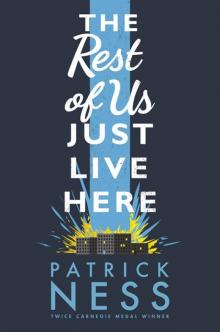 The Rest of Us Just Live Here
The Rest of Us Just Live Here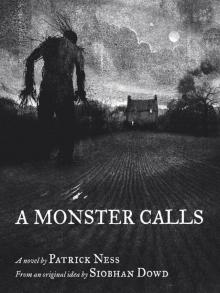 A Monster Calls
A Monster Calls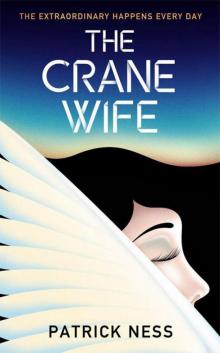 The Crane Wife
The Crane Wife Release
Release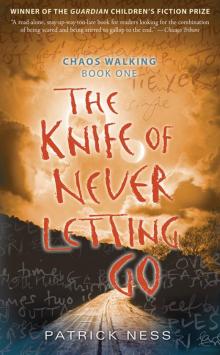 The Knife of Never Letting Go
The Knife of Never Letting Go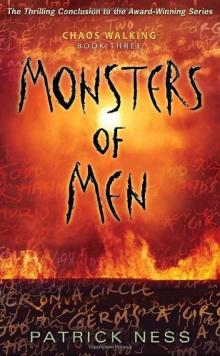 Monsters of Men
Monsters of Men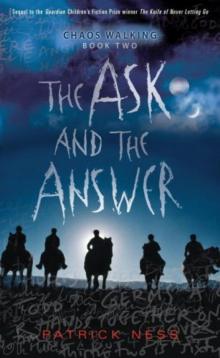 The Ask and the Answer
The Ask and the Answer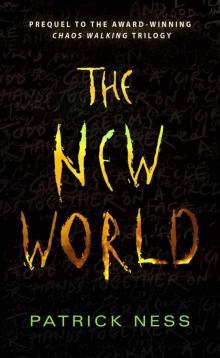 The New World
The New World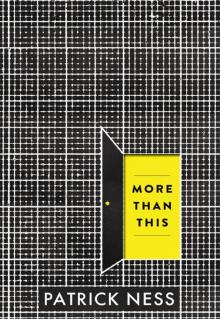 More Than This
More Than This Burn
Burn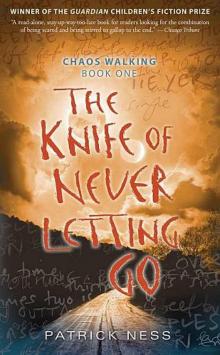 The Knife of Never Letting Go cw-1
The Knife of Never Letting Go cw-1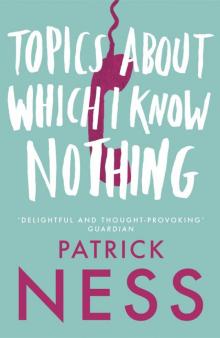 Topics About Which I Know Nothing
Topics About Which I Know Nothing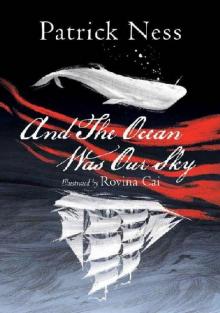 And The Ocean Was Our Sky
And The Ocean Was Our Sky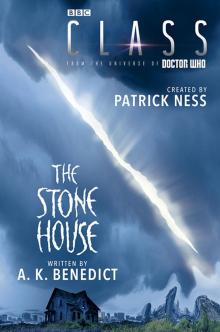 The Stone House
The Stone House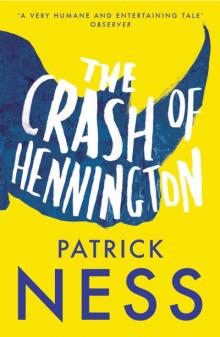 The Crash of Hennington
The Crash of Hennington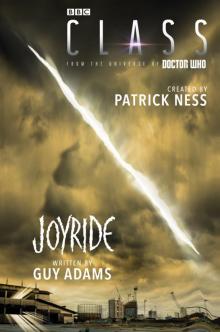 Joyride
Joyride What She Does Next Will Astound You
What She Does Next Will Astound You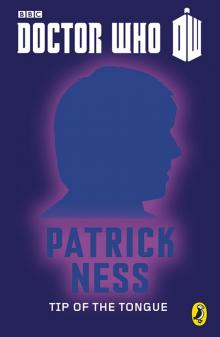 Tip Of The Tongue
Tip Of The Tongue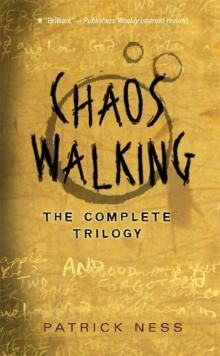 Chaos Walking
Chaos Walking